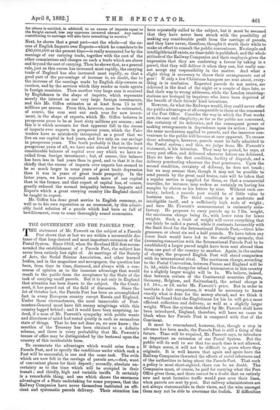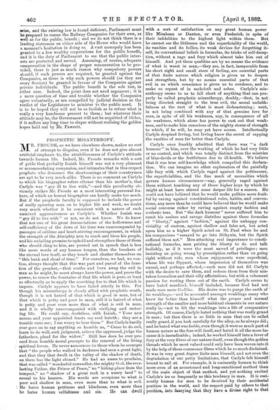THE GOVERNMENT AND THE PARCELS POST,
THE statement of Mr. Fawcett on the subject of a Parcels Post shows that at last we are within a measurable dis- tance of that long-desired and most important extension of the Postal System. Since 1842, when Sir Rowland Hill first recom- mended the establishment of a Parcels Post, the subject has never been entirely lost sight of. At meetings of the Society of Arts, the Social Science Association, and other learned bodies, and in the magazines and newspapers, the question has been, from time to time, discussed, and always with a con- sensus of opinion as to the immense advantage that would result to the public from the acceptance by the State of the task of carrying small parcels. But it is not only in England that attention has been drawn to the subject. On the Conti- nent, it has passed out of the field of discussion. Since the 1st of October last, the Parcels Post has been an accomplished fact in every European country except Russia and England. Under these circumstances, the most immovable of Post- masters-General must have felt uneasy misgivings while this country lagged behind ; and it would have been surprising, in- deed, if a man of Mr. Fawcett's sympathy with public wants and directness of mind had rested quietly in such an anomalous state of things. That he has not done so, we now know ; the sanction of the Treasury has been obtained to a definite scheme, and there is every probability that Mr. Fawcett's tenure of office may be distinguished by the bestowal upon the country of this incalculable boon.
To enumerate the advantages which would arise from a Parcels Post, and to specify the conditions under which such a Post will be successful, is one and the same task. The evils which are now felt in the carriage of parcels are,—first, want of convenient places for their deposit ; secondly, absolute un- certainty as to the time which will be occupied in their transit ; and thirdly, high and variable tariffs. It certainly is a remarkable thing, and one which shows the enormous advantages of a State undertaking for some purposes, that the Railway Companies have never themselves instituted an effi- dent and systematic parcels delivery. Their attention has been repeatedly called to the subject, but it must be assumed that they have never been struck with the possibility of making any considerable profit from the carriage of parcels, and they have never, therefore, thought it worth their while to make an effort to consult the public convenience. No simple and intelligible tariff exists, no time-table is published, and the whole attitude of the Railway Companies and their employds gives the impression that they are conferring a favour by taking in a parcel, that they will deliver it when they can, but really can- not accept any responsibility in the matter. And what a slight thing is necessary to throw their arrangements out of gear ! If only a few Christmas hampers are sent about, every- thing is in confusion. Expected parcels do not arrive, are delivered in the dead of the night or a couple of days late, or find their way to wrong addresses, while the London receiving- stations are besieged by inquirers who have been deprived of the benefit of their friends' kind intentions.
However, do what the Railways would, they could never offer the public advantages at all comparable to those at the command of the Post Office. Consider the way in which the Post works now, its ease and simplicity, so far as the public are concerned, the certainty of its deliveries, and the consequent power of making arrangements in dependence upon its action ; imagine the same mechanism applied to parcels, and the immense con- venience to the public will become at once apparent. To ensure these advantages, however, parcels must be fully admitted to the Postal system ; and this, we judge from Mr. Fawcett's statement, is his intention. They may be posted, ha says, at every post office, and delivered wherever letters are delivered. Here we have the first condition, facility of dispatch, and a delivery penetrating wherever the Post penetrates. Upon the second condition, certainty of delivery, he does not touch ; but we may assume that, though it may not be possible to send parcels by the great mail trains, care will be taken that a regular service is supplied for them, so that a commercial traveller, for instance, may reckon as certainly on having his samples by eleven as his letters by nine. Without such cer- tainty, indeed, a parcels post would be of little value to business men. The third condition is a moderate and intelligible tariff, and a sufficiently high scale of weight ; and here Mr. Fawcett's announcement is eminently satis- factory. He proposes to carry parcels up to 7 lbs. weight,
the maximum charge being 1s., with lower rates for lower weights. Such a limit of weight will cover everything that
can fairly be called a parcel, while it contrasts favourably with the limit fixed for the International Parcels Post,—three kilo- grammes, or about six and a half pounds. To have taken any lower limit would have led to the startling anomaly, that (assuming connection with the International Parcels Post to be established) a larger parcel might have been sent abroad than from one part of the country to another. Again, in the matter of charge, the proposed English Post will stand comparison with its international rival. The maximum charge, according to the Postal Convention, between France and England will be is. 9d., while the charge for inland transmission in this country for a slightly larger weight will be is. We believe, indeed, that between certain of the Continental countries (France, Germany, Belgium, and Switzerland), the actual charge is 1 f. 10 c., or 1d. under Mr. Fawcett's price. But in order to institute a fair comparison, it would be necessary to know exactly what is done for the money abroad, and we think it would be found that the Englishman for his is. will get a more efficient collection and delivery, as well as a slightly larger weight. When the system sketched by Mr. Fawcett shall have been introduced, England, therefore, will have no cause to blush when her Parcels Post is compared with that of the Continent.
It must be remembered, however, that, though a step in advance has been made, the Parcels Post is still a thing of the future. Time will be required, Mr. Fawcett says, to introduce so important an extension of our Postal System. But the public will do well to see that too much time is not allowed. If delays occur, it will not be difficult to guess where they originate. It is well known that again and again have the Railway Companies thwarted the efforts of social reformers and of the authorities to bring about the Parcels Post. That such a policy is most short-sighted, there can be no doubt. The Companies must, of course, be paid for carrying what the Post Office gives them, and there cannot be a doubt that an entirely new and most lucrative traffic would pass over their lines, when parcels are sent by post. But railway administrators are not always statesmanlike in their views, and the wise amongst them may not be able to overcome the foolish. If difficulties ,arise, and the existing law is found deficient, Parliament must be prepared to coerce the Railway Companies for their own, as well as for the public, benefit ; and we do not think there is a leading statesman on either side of the House who would have a moment's hesitation in doing so. A vast monopoly has been granted to a few wealthy corporations for the public benefit, and it is the duty of Parliament to see that the public inter- ests are protected and served. Assuming, of course, adequate compensation in the shape of proper remuneration to be pro- vided, there is just as much reason why compulsory powers should, if such powers are required, be granted against the Companies, as there is why such powers should (as they are every Session) be granted in favour of the Companies against private individuals. The public benefit is the sole test, in either case. Indeed, the point does not need argument ; it is a mere question of time and trouble whether the Companies agree voluntarily, or are compelled by judicial decision or the verdict of the Legislature to minister to the public need. It is to be hoped they will not be so foolish as to refuse what is really a very handsome present to them ; but whatever their attitude may be, the Government will not be acquitted of lciches, if it suffers any long time to elapse without realising the golden hopes held out by Mr. Fawcett.



































 Previous page
Previous page